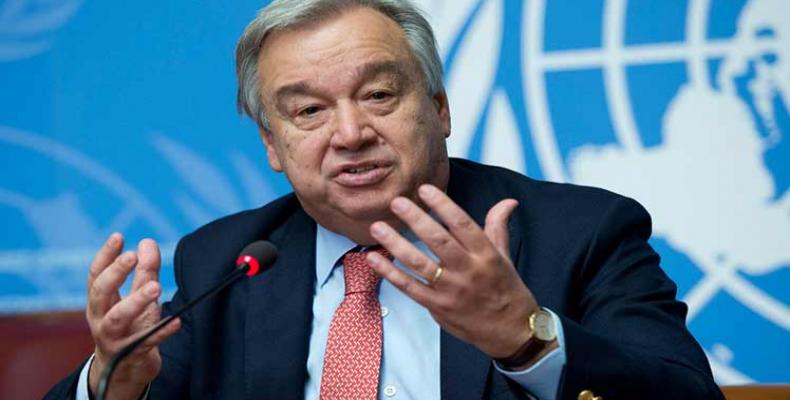United Nations, August 3 (RHC)-- UN Secretary General Antonio Guterres, during a press briefing in New York, said that there have always been hot summers, but the weather that the northern hemisphere is currently experiencing is “not the summer of our youth”, but a climate emergency.
Data published by the UN World Meteorological Organization (WMO) shows that 2019 had the hottest June ever, with records broken from New Delhi to the Arctic Circle. July is also on course to equal, or surpass the hottest month in recorded history, and 2015 to 2019 are likely to be the five hottest years on record.
“If we do not take action on climate change now”, said Guterres, “these extreme weather events are just the tip of the iceberg. And that iceberg is also rapidly melting.”
Speaking about the Climate Action Summit, slated for September 23rd in New York, the UN chief said that the ticket to entry -- for governments, business and civil society -- is “bold action and much greater ambition.” He noted that this will be needed if the world is to limit temperature increases to 1.5C and avoid the worst impacts of climate change, by cutting 45 per cent of greenhouse gas emissions by 2030, and achieving carbon neutrality by 2050.
“Beautiful speeches”, the UN chief said, are therefore not enough: leaders need to come to New York on September 23 with concrete plans to reach these goals. And Guterres emphasized that many solutions are available and are already being implemented.
These include the growing use of technology that is rendering renewable energy cheaper than fossil fuels the planting of millions of trees to reverse deforestation, and remove carbon dioxide from the environment. It also includes the finance world increasingly pricing carbon risks into their decision-making process and calling on leaders to phase out fossil fuel subsidies and leading businesses are recognizing that, in order to avoid huge losses, now is the time to move from the “grey”, polluting economy, to the green economy. “We need rapid and deep change in how we do business, generate power, build cities and feed the world.”
Regarding the solution of phasing out of fossil fuel subsidies that Antonio Guterres has been championing, the Global Subsidies Initiative (GSI) of the International Institute for Sustainable Development (IISD) has found that reforming the USD 372 billion countries spend each year on fossil fuel subsidies and reallocating between 10 and 30 per cent of the savings to renewable projects would pay for a transition to clean energy.
Their report provides examples of four countries—India, Indonesia, Zambia and Morocco—where governments have already been taking concrete actions to reform fossil fuel subsidies and kick start the replacement of fossil fuel energy sources with renewables.
In India, petroleum subsidies have been cut by around 75 per cent since 2014, freeing up funds to support the development of world-leading wind and solar industries.
Seizing the opportunities of climate action, the upcoming Latin America and Caribbean Climate Week 19-23 August in Salvador and the Asia-Pacific Climate Week 2-6 September in Bangkok are gearing up to boost the region’s response to the climate crisis.
The results of the two meetings will feed into the outcome of the Climate Action Summit organized by the Secretary-General on September 23rd in New York, thereby boosting ambition and accelerating the implementation of the Paris Agreement and the 2030 Agenda for Sustainable Development.
The results of the climate weeks will be a key contribution to the UN Climate Change Conference (COP25) to be held in Santiago, Chile, from December 2nd to the 13th.


